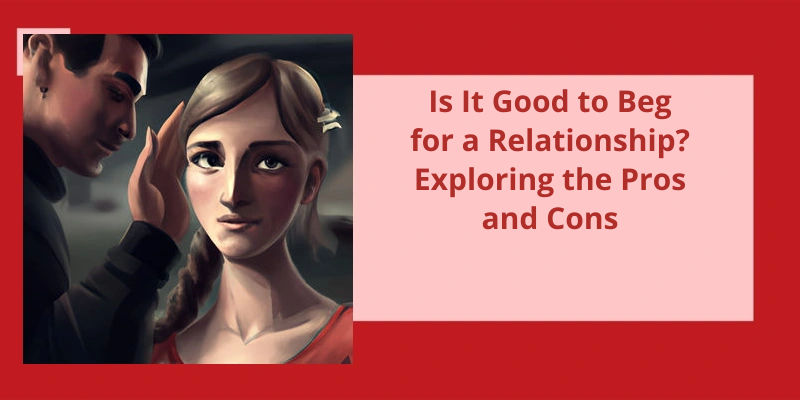The act of begging for a relationship is a topic that’s been debated for ages. While some individuals believe that it’s a valid method to attain love and affection, others argue that it’s a misguided approach that can harm one's self-esteem. Begging for love can be a dangerous game that may lead to the perception that you don't know your true worth. It may even convince others to believe that you’ve no value or self-respect. As a result, it’s vital to consider the impact of begging for love on your self-worth and self-esteem.
Is It Bad to Beg for Someone?
Furthermore, begging for someone to stay is also a sign of desperation and a lack of self-respect. It can be easy to become emotionally attached to someone and therefore feel like you can’t live without them, however, by begging for someone to stay you aren’t doing yourself any favors. You’re essentially allowing them to have power and control over you which isn’t a healthy foundation for any relationship.
It’s essential to remember that a relationship should be built on mutual respect, trust, and love. If someone truly loves you, they’ll see your value and fight for you. However, if they do not, then you shouldn’t have to beg for them to be with you. Being with someone who doesn’t want to be in the relationship isn’t only unfair to you but also to them. No one should be in a relationship they don’t want to be in, and by begging for them to stay, you’re essentially forcing them to do something they don’t want to do.
It’s important to recognize that our value and self-worth shouldn’t be dependent on others, especially when it comes to love. Begging for love can easily lead to a negative impact on our self-esteem and worth, as we may begin to question our value and what we deserve. In the following section, we will explore the dangers of begging for love in greater detail and offer tips on how to avoid this destructive behavior.
What Happens When You Beg for Love?
When you beg for love, you’re essentially asking someone to give you something that should be freely given. Love isn’t something that can be forced or coerced, it’s something that should be offered willingly and without hesitation. This can be a turn-off to many people, and it can also make you seem less desirable in their eyes.
Unfortunately, begging for love can also lead to a cycle of dependency. If you constantly beg for someones love and affection, you may start to feel like you cant live without them. This can be dangerous because it can cause you to compromise your values and beliefs just to keep them around. You may also become emotionally dependent on them, which can make it difficult to break away if the relationship doesn’t work out.
Another danger of begging for love is that it can lead to emotional manipulation. When you plead with someone to love you, you’re essentially manipulating their emotions. This can be harmful not only to you but also to the other person. Emotional manipulation can lead to a toxic relationship, where one person is always trying to control the other. This isn’t healthy for anyone involved, and it can lead to long-term emotional damage.
When you’re desperate for someones love, you may be willing to tolerate behavior that you’d normally find unacceptable. This can include emotional, verbal, or even physical abuse. You may feel like you’ve to put up with this behavior in order to keep the person around. This isn’t a healthy mindset, and it can lead to long-term damage to your self-esteem and mental health.
The Impact That Begging for Love Can Have on the Person Being Begged, Including Feeling Pressured or Uncomfortable
Begging for love can make the recipient feel pressured or uncomfortable.
Source: 5 REASON WHY YOU SHOULD NOT BEG OR FIGHT FOR …
When you’re in a relationship, it’s natural to want to make your partner happy. However, there’s a fine line between being loving and affectionate, and begging for their attention and affection. When you constantly feel like you’re putting in all the effort and not receiving much in return, you may begin to question the authenticity of the relationship. It’s essential to understand what begging for love means and how to avoid it in your relationship.
What Is Considered Begging in a Relationship?
Begging in a relationship can often lead to an unhealthy and unbalanced dynamic between partners. It often involves one partner continuously seeking validation or attention from the other, while the other partner may feel overwhelmed or burdened by these constant demands. This can cause feelings of resentment or frustration to build over time, which ultimately damages the trust and intimacy that’s necessary for a healthy and fulfilling relationship.
This can manifest in multiple ways, such as excessive texting or calling, constant reminders of their love for their partner, or even begging for physical affection or intimacy. While it’s natural to want to feel loved and valued by our partners, it’s important to recognize when these actions become excessive or one-sided.
This can lead to a sense of codependency, where one partner feels as though they can’t be happy or fulfilled without the other. Over time, this can lead to a loss of individual identity and a lack of personal growth, which can ultimately harm both partners in the long run.
This can occur when one partner is always initiating conversation or plans, always making sacrifices or compromises, or even taking on a majority of the household responsibilities. This can lead to feelings of resentment and an unbalanced power dynamic in the relationship.
This may involve setting boundaries, communicating openly and honestly about your needs and expectations, and developing a stronger sense of individual identity and self-worth. By taking these steps, you can create a stronger, more fulfilling relationship that’s based on mutual respect, trust and love.
How to Distinguish Between Healthy Reassurance-Seeking Behavior in a Relationship Versus Begging.
Healthy reassurance-seeking behavior in a relationship involves open and honest communication without any pressure or manipulation. On the other hand, begging involves repeatedly asking for reassurance despite receiving clear answers and may involve guilt-tripping or emotional manipulation. One way to distinguish between the two is to look for patterns of behavior and assess whether the person is seeking reassurance for genuine reasons or to fill an unmet emotional need.
It’s important to understand the negative consequences that come with begging your partner to stay in a relationship. It can be emotionally exhausting and can lead to a lack of respect. Let’s explore this further.
What Happens When You Beg in Relationship?
This might even lead to a vicious cycle where you try harder to please your partner, but they take you for granted and keep demanding more from you. The more you beg, the more they take advantage of you, and the less they value you as an individual. Eventually, this can lead to a breakdown in your relationship, leaving you feeling angry, helpless, and alone.
Begging also creates an unhealthy power dynamic in a relationship. It gives your partner more control over you, and they can use this power to manipulate you and make you do things you don’t want to do. When youre constantly begging for their attention, love, or respect, youre essentially giving up your own rights and needs for theirs. This can lead to a toxic cycle where your partner becomes more and more controlling over time, and you become more and more submissive.
Begging can also damage your self-esteem and sense of self-worth. When youre constantly seeking validation from someone else, youre essentially telling yourself that youre not good enough on your own. This can lead to feelings of insecurity, anxiety, and depression, and it can make it hard for you to form healthy relationships in the future.
When youre constantly begging for someone elses affection or approval, youre not focusing on your own goals and passions. Youre essentially giving up your own agency and autonomy for the sake of pleasing someone else. This can lead to a feeling of emptiness and unfulfillment, and it can make it hard for you to find happiness or meaning in your life.
How to Break the Cycle of Begging in a Relationship
Exploring ways to stop constantly asking for things from your partner can help to prevent a cycle of begging in your relationship. This may involve reviewing expectations, setting boundaries around needs and exploring potential underlying issues that may be driving the behavior.
Breaking up with someone can be a tough and emotionally grueling experience. For some, it can be tempting to try and win their ex back by begging or pleading for a second chance. However, according to experts, this may not be the best course of action. Rather, it’s important to put yourself first and resist the urge to beg for your ex’s affections. After all, a breakup happens for a reason, and sometimes it’s simply because two people are no longer compatible or have changed over time.
Is It Okay to Beg After Breakup?
It’s a common question that arises in the aftermath of a breakup, whether it’s acceptable to beg or request your ex to come back. The answer, according to experts, is a resounding no. In fact, it’s highly discouraged to resort to begging or pleading with an ex to rekindle the relationship. While it may be tempting to hold on to hope, doing so only prolongs the healing process and stunts personal growth.
The harsh reality is that a breakup happens for a reason. Often, the reason may have nothing to do with you personally, but rather be a result of incompatibility or changes in the individuals involved. It’s important to accept this, grieve the loss, and move forward with self-improvement and healing. While it’s natural to want to fix things and “win” your ex back, doing so only perpetuates the cycle of instability and heartache.
It’s also important to consider the impact begging may have on your ex-partner. When someone is begged or guilted into a relationship, it isn’t a healthy or sustainable foundation for any future. It’s important to respect your exs decision to end the relationship and give them the space they need to move on. While it may be uncomfortable to let go, it’s crucial to prioritize your own emotional well-being and not rely on someone else for validation.
Another factor to consider is personal growth. A breakup can be an opportunity for introspection and self-evaluation. By focusing on personal growth and development, one can overcome insecurities and issues that may have contributed to the breakup. This self-reflection may lead to greater self-awareness and the ability to develop healthier relationships in the future.
Ultimately, it’s vital to resist the temptation to beg or plead for a relationship that’s ended. It’s important to put oneself first and prioritize personal healing and growth. While it may be difficult to let go, it’s necessary for both individuals to move forward and create healthier futures. By focusing on self-improvement and respect for one anothers decisions, a more positive and fulfilling future can be achieved.
Conclusion
While the fear of being alone or losing someone you love can be overwhelming, it isn’t worth sacrificing your self-respect and dignity. Learn to love and respect yourself first, and let others see your worth and value. Remember that a healthy and fulfilling relationship is built on mutual respect, trust, and genuine love, not on coercion or desperation. So, be confident in who you’re and the love you deserve, and trust that the right person will come into your life at the right time.






